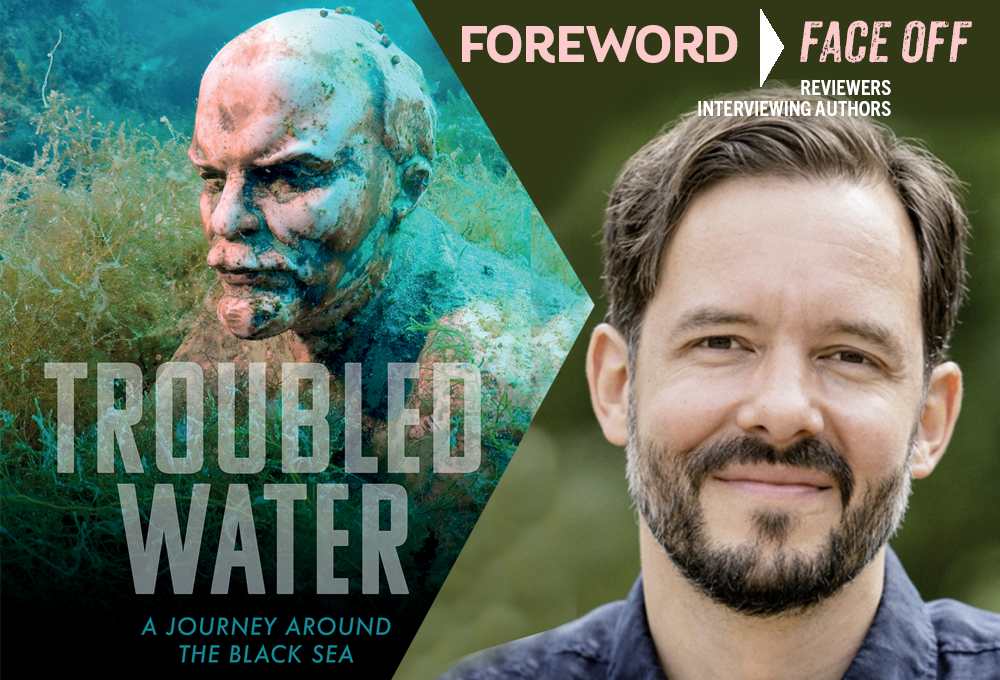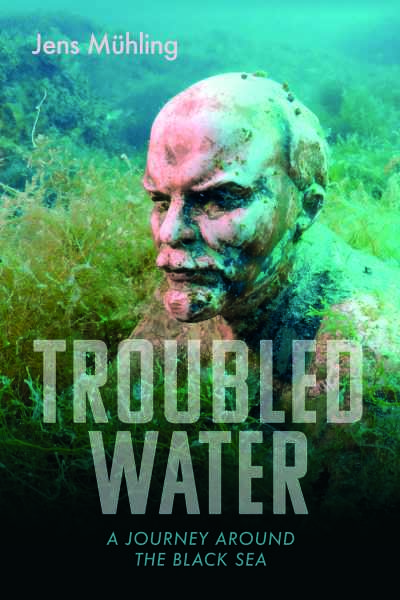Reviewer Erika Harlitz-Kern Interviews Jens Mühling, Author of Troubled Water: A Journey Around the Black Sea

Historically, if you were looking for affordable beachfront property with a good view of a war, you could scarcely do better than a place on the Black Sea—bordered by Bulgaria, Georgia, Romania, Russia, Turkey, and Ukraine, this region has long been rocked with tension. And now, with Russia’s unconscionable invasion of Ukraine, a Black Sea retreat offers all the sights and sounds of a modern bloodbath, including the possibility of Putin using a tactical nuclear weapon to compensate for his small hands and bumbling military.
This week, journalist Jens Mühling is here to discuss his recently released Troubled Water: A Journey Around the Black Sea with Erika Harlitz-Kern, who lauded the book with a starred review in Foreword’s May/June issue. Oh, and if you’re still considering that beachfront home, Jens says the 
Ukraine war is a continuation of things that have been happening for centuries and serves as a “tragic aspect of Black Sea life,” so you’ll have to put up with some rowdy neighbors.
The Black Sea has been contested waters for thousands of years, but it’s rarely mentioned in discussions on history and international relations. What was it about this body of water that interested you, and why did you decide to write a book about it?
I’m a reporter, and I work for German newspapers and magazines. My main focus is Eastern Europe, so I have spent the last two decades writing predominantly about Russia and also about Ukraine. I lived in Moscow for two years and in Kiev for a year. I went to Crimea in 2014 at the time when it was annexed by Russia. I was there when the Russians manipulated referendum to make Crimea break away from Ukraine. I arrived in Crimea when it was still Ukrainian and by the time I left, it was Russian. That was quite an experience.
I’ve been to a lot of other places along the Black Sea as well as all these places in the former Soviet Union and at some point, I started to notice that when you travel to this region, you meet a lot of people who are from other parts of the Black Sea coast. So, I became interested and wanted to see the other parts of the Black Sea. I wanted to see if there is something that links these coastal regions with each other, if there is a common Black Sea identity that transcends the national borders. That’s what made me start on this journey.
Troubled Water is based on your travels around the shores of the Black Sea, which took about a year to complete. What were your expectations when you started your journey, and how did they change as the journey went on?
Usually the way I plan these journeys is that as soon as I have an idea of what I want to find out, I start reading a lot about the regions that I’m going to visit. Then I make a list of places that I find interesting and that also have people I will want to talk to and feature in the book. But then, of course, during the course of the journey, these plans change, because once you actually go to these regions, you will meet people who just weren’t on your radar before you started. I usually end up throwing large parts of my plans overboard and just go with the flow. It’s always a mixture of planned travels and spontaneous travels. Also, of course, your ideas of the place that you travel to change a lot during the course of the journey.
There is one part of the book that reminds me of that. You were looking for a Greek person who spoke Turkish, and people kept pointing you in all kinds of directions. In the end, you ended up in a place where you did not expect to be.
Exactly. That happens all the time. You meet people and you follow these hints and you end up with the most wonderful stories.
One of the things that I found fascinating about Troubled Water are the many different ethnic groups, cultures, and languages that live on the shores of the Black Sea. I knew from before that the countries that surround the Black Sea are not monoliths but your book opened my eyes as to how incredibly diverse they are and how distinct each culture is from one another. I was wondering if you could talk a little bit about your experiences of this as you traveled around the shores of the Black Sea and met with different people.
I knew about some of these minorities, but as I was traveling I met a lot of others who I had never heard of before. I met a guy in Russia who told me that his ancestors had lived in Georgia, but then they had been deported to Central Asia, and by the time the Soviet Union collapsed some of them moved back to the Black Sea and now live on the Russian coast of the Black Sea. That was a very typical. And usually these minorities are very aware of the history. You meet a lot of minorities who had to change their coastal region repeatedly over the course of the centuries, and they are very eager to tell you.
What would you say is the greatest misunderstanding about the Black Sea and the countries that surround it?
I think people tend to think that the divisions between the nations around the Black Sea are clear cut. That you will find Russians on the Russian coast, Ukrainians along the Ukrainian coast, and Turks along the Turkish coast, and so on. But in reality, all countries are ethnically mixed
I think that the biggest misunderstanding that people have about the Black Sea is that the nation states are what define the sea.
What is the one thing you think people should know about the Black Sea and the countries that surround it that people generally don’t know?
That almost all of the Black Sea is dead. There is no oxygen in the water. It’s only at the surface of the Black Sea that we find marine life, fish, and plant species, but below that there’s no life at all until the very bottom of the Black Sea. The reason for this is because of the two currents in the sea where one consists of fresh water and the other salt water, and these layers of sea water don’t mix.
Is there anything you want to add that you think is important for readers to know about the book or about the Black Sea?
Since the book was written and published, a lot of things have happened around the Black Sea, especially the ongoing war between Russia and Ukraine. This war is, in a sense, a continuation of things that have been going on around the Black Sea for centuries. That is a tragic aspect of Black Sea life because it has been formed by tragedies that force people to migrate, which is something that this book is about.
Erika Harlitz Kern
